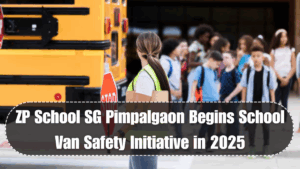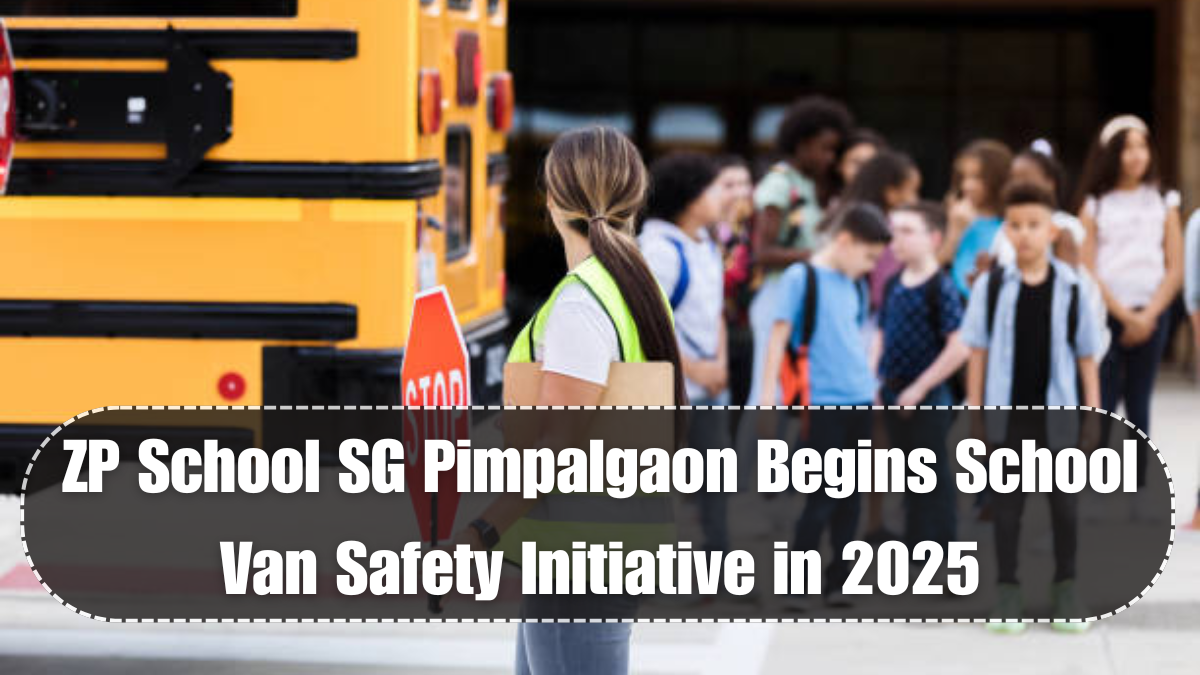The school transport safety rural initiative launched by ZP School SG Pimpalgaon in 2025 is a milestone in protecting students who travel daily via vans in remote regions. Recognizing the unique challenges of rural school commutes—often involving poor road conditions, unregulated drivers, and vehicle overcrowding—the school has introduced a structured van safety campaign focused on student welfare and driver accountability.
This initiative reflects a growing awareness of the need for enhanced rural safety standards in educational institutions. With support from local authorities and transport inspectors, ZP Pimpalgaon’s program includes inspections, driver training, safety audits, and awareness drives that bring school van operations in line with official road rules and best practices.

Van Safety Checks and Compliance Measures
One of the first major actions taken under the school transport safety rural program was the mandatory inspection of all school vans entering and leaving the school premises. Vehicles are now routinely checked for:
-
Working seatbelts and child locks
-
Proper insurance and roadworthiness certificates
-
Emergency exit markings and tools
-
Trained and licensed drivers
-
Restricted speed limit stickers
This daily safety routine ensures that school vans are no longer left unchecked. Any van that fails to meet compliance is denied access until rectifications are made. These checks are not just a formality—they’ve significantly improved travel conditions for the students of ZP Pimpalgaon.
ZP Pimpalgaon Leading Rural School Reform
ZP School SG Pimpalgaon has emerged as a role model for rural institutions across the district. The administration has made rural safety a core part of its educational mission. Teachers and school management staff have been trained to recognize vehicle irregularities, engage with drivers, and document concerns. This shared responsibility approach ensures that safety isn’t limited to one department—it’s everyone’s business.
Special seminars were also conducted for parents and local van owners, educating them about the importance of following road rules, limiting van capacity, and avoiding risky shortcuts on unpaved routes. The collective mindset is now shifting toward safety-first transport.
Road Rules Awareness for Drivers and Students
A critical component of the school transport safety rural campaign is road safety education—not just for van drivers, but for students as well. Road rule awareness sessions have been introduced in morning assemblies, where students learn:
-
The importance of boarding and deboarding only at designated stops
-
Wearing seat belts at all times
-
Reporting rash driving or over-speeding
-
Understanding common traffic symbols and hand signals
For van drivers, sessions cover updated road rules, child safety protocols, and basic first-aid training. These sessions are conducted in collaboration with local police and transport officials to ensure legal accuracy and real-world application.
A Model for Safer Rural Student Transport
The school transport safety rural campaign has already yielded visible improvements. Students now travel in better-maintained vans, drivers are more aware and accountable, and parents are assured of their children’s daily safety. ZP School SG Pimpalgaon’s commitment to safer transport is a positive step toward systemic change in rural education infrastructure.
This success story is already inspiring neighboring schools to adopt similar strategies. With continued community support, the initiative is poised to grow into a district-level model for student transport safety and rural safety enhancement.
FAQs
What is the school transport safety rural program at ZP SG Pimpalgaon?
It’s a safety initiative focused on ensuring that school vans in rural areas meet proper road safety standards and driver compliance requirements.
How are school vans being checked under the program?
Vans are inspected daily for valid documents, safety tools, seat belts, and trained drivers. Non-compliant vehicles are barred until issues are fixed.
What role do teachers play in this campaign?
Teachers are trained to identify transport risks, interact with van drivers, and help maintain a record of vehicle behavior and student complaints.
Are students also trained in road safety?
Yes, students attend regular sessions to learn about traffic symbols, safe boarding practices, and how to report unsafe driving.
Can this rural safety program be replicated in other schools?
Absolutely. The structure and results of this initiative make it a scalable model for other rural schools aiming to improve student transport safety.
